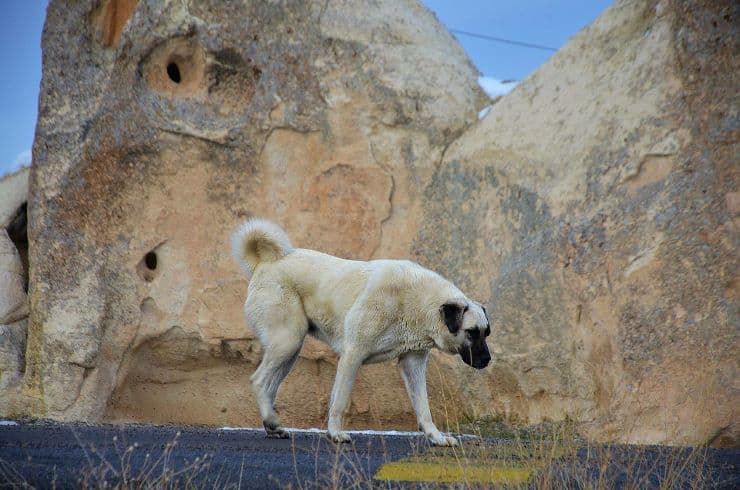Brit: Why are Kangal dogs illegal in the U.S?
I saw a Kurdish Kangal dog for the first time on the internet. I know that they are used to protect herds and they keep wolves, bears, etc away but they also are known to have a good temperament and to be gentle with children. So I was just wondering why they would be illegal in the U.S... Does it have anything to do with dogfighting?
Answers and Views:
Answer by Ohioian
It’s not that they are illegal to own in the U.S ( I don’t know about other places) but Turkey has a ban on shipping Kangals that we’re born in their country because it is their Country’s national treasure/ dog. It also makes rescuing them very hard there.
Answer by Kenny 5
There is no Kurdish Kangal but known as Kangal or Anatolian shepherd or Turkish shepherd dog. Many Kangal clubs. And breeding farms around the nation and one in North Carolina town called Earlywill. (Discussion: Are Kangals Turkish or Kurdish?)
Answer by Keith
If you look on the internet on some site it does say they are illegal in the US that why I came to this site I wanted to know why I thought it was because that people were scared of them, if you go on liveleak you will see the Kangal dog killing pit bulls very fast even pit bulls of its size, that’s why I thought they didn’t want it here for people who like to fight dogs.
Answer by ♥Love♥
There are certain breeds that are illegal in the U.S. on a city and county level. I don't think ANY state as a whole has banned any breeds (although one, Ohio I believe? is close with "pit bulls"). And NO dog is banned throughout the entire country. Federal Laws have better things to deal with than dog ownership.
Kangals, from what I've read, can be pretty stranger aggressive dogs. Not recommended for first-time owners at all.

Answer by ♥Love Herds♥
They are not illegal in the US.
There is a Kangal breed club of America.
Answer by Highflier
Kangals are great dogs but are not especially good for living on less than a few acres (or more) of fenced property. Very protective and great around kids. They are a really pure breed of dogs that are wired to look off to the horizon for any reason to protect what is theirs, they are always on alert. That's what they have been bred to do for hundreds of years.
Got to have a good fence.
They are extremely intelligent but, at the same time, independent.
There are some bans in Europe, but none here.
We have a male that is an excellent dog, but he would be difficult to handle for someone who didn't have a solid background handling strong-minded dogs, extremely large ones at that.

Answer by Tulip
I can't find any information in the Kangal dog being illegal in the US.
Why would they have a Kangal Dog club in America and breeder referral listed, and being a breed club they are reputable breeders. So in answer to your question they cannot be illegal
Must be another state you're referring to or another breed with a similar sounding name
Current State of the Law Breed banned
Statutes and Ordinances
(1) Denver, Colorado has prohibited "any person to own, possess, keep, exercise control over, maintain, harbor, transport, or sell within the city any pit bull."28 The ordinance defines "pit bull" as "any dog that is an American Pit Bull Terrier, American Staffordshire Terrier, Staffordshire Bull Terrier, or any dog displaying the majority of physical traits of any one (1) or more of the above breeds, or any dog exhibiting those distinguishing characteristics which substantially conform to the standards established by the American Kennel Club or United Kennel Club for any of the above breeds."29
(2) Waterford Charter Township, Michigan has prohibited any prospective "possession, maintenance, and harboring" of any "pit bull terriers," and justifies the prohibition by stating that "the township has further concluded that it is in the interest of public health, safety, and welfare that the presence of pit bull terriers be limited in this community to only those existing licensed pit bull terrier dogs in order that the threat of this breed will eventually be removed from this community."30
(3) Des Moines, Iowa defines "vicious dog" to include the American Staffordshire Bull Terrier and the Pit Bull Terrier, and imposes stringent confinement, licensure, and control requirements (including provisions for animal seizure and disposal) upon any animals deemed "vicious" under the ordinance.31
(4) North Little Rock, Arkansas has restricted ownership of Rottweilers, Pit Bulls, or Bull Terriers or mixes thereof by implementing a breed-specific licensure fee of $ 500.00 – far more than license fees for other breeds.32
The general purpose of these laws is to either discourage, restrict, or prohibit certain breeds of dogs that are defined as "dangerous" within certain jurisdictions. Nearly all the laws, when implemented, included a "grandfather clause" which allowed current owners of the specified breeds to keep their dogs but prohibited any prospective acquisitions or breeding. Because current owners were not stripped of their rights to keep their "banned breed" dogs, merely due to their breed identity, the enactment of the BSL did not amount to a taking of their property.
- Does the Kangal Dog have the strongest bite force?
- Which would win a Kangal or a pit bull in a dog fight?
- Kangal, Central Asian Ovcharka, or Caucasian Ovcharka?
At the state level, statutes rarely prohibit or restrict specific breeds. Instead, the statutes tend to focus more on the dogs' and owners' conduct, and on dangerous behavior regardless of breed. For example, Michigan's state statutes define a "dangerous animal" as:
[A] dog or another animal that bites or attacks a person, or a dog that bites or attacks and causes serious injury or death to another dog while the other dog is on the property or under the control of its owner. However, a dangerous animal does not include any of the following: (i) An animal that bites or attacks a person who is knowingly trespassing on the property of the animal's owner. (ii) An animal that bites or attacks a person who provokes or torments the animal. (iii) An animal that is responding in a manner that an ordinary and reasonable person would conclude was designed to protect a person if that person is engaged in a lawful activity or is the subject of an assault.
Nowhere in the Michigan statute governing "dangerous animals" will the reader find specific breeds listed. The statute regulates dog behavior, rather than the identified breed of dog. In contrast, enforcement of BSL is not dependent on a dog's behavior; instead, a specific dog can be deemed "dangerous" as a result of the breed an animal control officer believes it to be, even if the dog has displayed no vicious or aggressive tendencies.
Florida state law contains a similar section, which again does not specify particular breeds of dogs, but instead proscribes types of behavior by dogs which are subject to penalty. "Dangerous dogs" are defined, in part, as those which have "aggressively bitten, attacked, or endangered or has inflicted severe injury on a human being on public or private property," as well as those which have "when unprovoked, chased or approached a person upon the streets, sidewalks, or any public grounds in a menacing fashion or apparent attitude of attack . . . ."
Ohio, on the other hand, has specifically pointed to "pit bulls" as vicious dogs per se. In Section 955.11(A)(4)(a)(iii), the Ohio Legislature has stated that a vicious dog includes one which "belongs to a breed that is commonly known as a pitbull dog. The ownership, keeping, or harboring of such a breed of dog shall be prima-facie evidence of the ownership, keeping, or harboring of a vicious dog."
Interestingly, two states have actually prohibited local governments from adopting ordinances that regulate dangerous dogs based solely on the breed of the dog."
Answer by Kahraman
Turkish Kangal is not illegal in the US. I don’t know about Kurdish Kangal. Never heard of it!
Know better? Give your own answer to this question!


John S says
Wow. Calls Turkish Kangal as Kurdish Kangal on purposely. This person is not really interested about the dog. He is trying to make a point.
Mert says
They are NOT “Kurdish.” They are TURKISH Kangal dogs, and you know it, too, you stupid russian.
Mr. Lawrence says
The Turkish Kangal dog is the popular LGD line of the anatolian shepherd, but there is another variety of anatolian dog of a different name which I cannot place at the moment, which was known to have been bred by the Kurds and tends to have a larger stature and head than your typical Turkish Kangal. It is very much like a Turkish Kangal but the proportion of head to body is more pronounced and I’ve heard their temperament is not as mild as the Turkish Kangal. Very little information is even available about these dogs as far as I’m aware but I have heard them referred to as Kurdish Kangals.
SiziKomikKurdolar says
her name is shepherd dog. that dog is a Turkish dog
SiziKomikKurdolar says
her name is MALAKLI shepherd dog. that dog is a Turkish dog. lives in Aksaray/TURKEY
Peter Zolton says
I am searching for a puppy or young male Kangal please that is for sale.
Thank you,
Peter A.Zolton
[email protected]
September 13, 2019
RussianDog says
You might also want to check our post Where in the USA can I buy a Kangal dog?
Butterfly says
I have Kangals
I have farms in Colorado, New Mexico and Missouri. You need a lot of room. And yes they are okay with kids but one of mine attacked my 23 year old son after he grew up with dog. Was over a lamb lung. He would have killed that boy to get that. Not a mean dog at all. Just very strong and very opinionated. You need to be a master level dog whisperer to keep a Kangal on 3 acres or less and they will never be happy in a house and yard. At 7 months every one of mine has wanted to go out and work and never come in again except for my matriarch female who has her own room in my house complete with voctorian wallpaper and vintage linens. She is a stunning beauty and likes to get her rest indoors on occasion. The other dogs? No way in hell could I get them to come inside. They are serious serious guard dogs that think nothing of barking at a 2 year old or 90 year old for getting too close the fence. My dogs are all trained to attack if anyone or anything this isn’t my animal touches the fence. They stay in the fence but if someone like a ditch rider or electric company comes along, they will wait and see if they touch the fence. They touch the fence it’s over. Every one of those dogs will be over it and attack that person. So be extremely careful. I have a 7 million dollar insurance policy on these dogs
dale burkett says
I call bull shit. First of all you can not spell and second BULLSHIT
Ohioian says
The comment has been moved into the body of the post.
Cheryl says
I own 2 Turkish Kangal’s. Yes they are the strongest dogs and the most protective of their loved ones but aggressive dogs they are not! They do not attack as some do. They alert with a ferocious bark and access a situation before reacting. So sad how people are trying to stereotype them as other breeds have been done. Do the research if you don’t own this breed yourself or have had personal experience with a Kangal. Just saying!
RussianDog says
Thank you for your comment. We have published it on our Facebook page https://www.facebook.com/RusDog.
doglover says
The comment has been moved into the body of the post.
Rulars says
The comment has been moved into the body of the post.
Kenny 5 says
The comment has been moved into the body of the post.
Sera says
KURDISH KANGAL??? ???? that’s not true
KANGAL DOGS ARE FROM TURKISH
Kahraman says
The comment has been moved into the body of the post.
Peter says
A Kangal today, May 31, 2017, killed a 72 year old woman out for a walk in a small town in Baden-Württemberg, Germany.
The dog escaped from his owner’s garden and mauled the woman to death in the middle of a street in front of a number of horrified neighbors and bystanders.
Police and rescue services were not able to get to the woman until after she had been killed, and the dog had walked away.
The police then shot and killed the dog.
A police spokesman said that they had never seen such horrific injuries on a person.
Source: Spiegel
Keith says
The comment has been moved into the body of the post.
mert says
kurdish? what kind of word arrangement bullshit is it? who created that “kurdish kangal” name I really wonder cuz thats really funny, a product of a plan in middle east, a game, an operation of perception like usa call pkk as “freedom fighters” but we are still here, aganist invader western armies and their coyotes in our lands
Ahogan says
The export out of the country is what is banned, not owning the dog.
Gokhan says
It is an ancient Turkish breed, since when Kurdish?
Rejin says
Central Asian Shepherd Dog and Kurdish Kangal, are they same? when you search for images in google you see different dogs it seems. If anybody know, kindly explain
admin says
Kangal is a close relative of the Central Asian Shepherd, not officially recognized as an individual breed.
Lale says
Kurdish Kangal? Are you serious???? Its a Turkish shepherd dog like the German shepherd dog of Germans.
Jenni says
Are they? I have come across Kangal breeders in the US before. Where did you get the information that they are illegal?